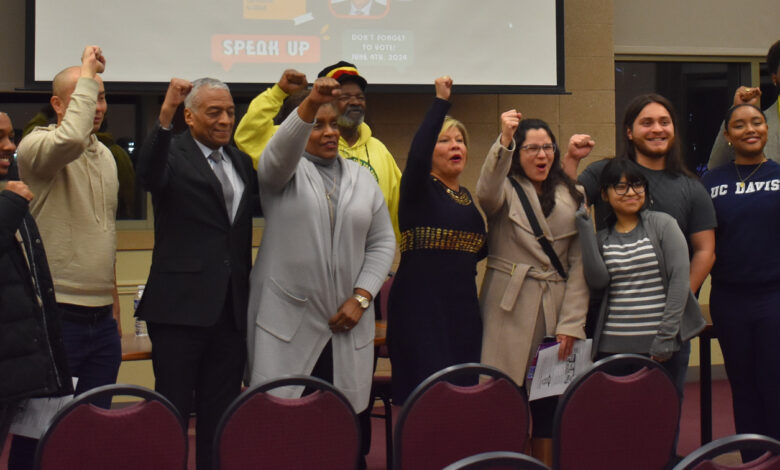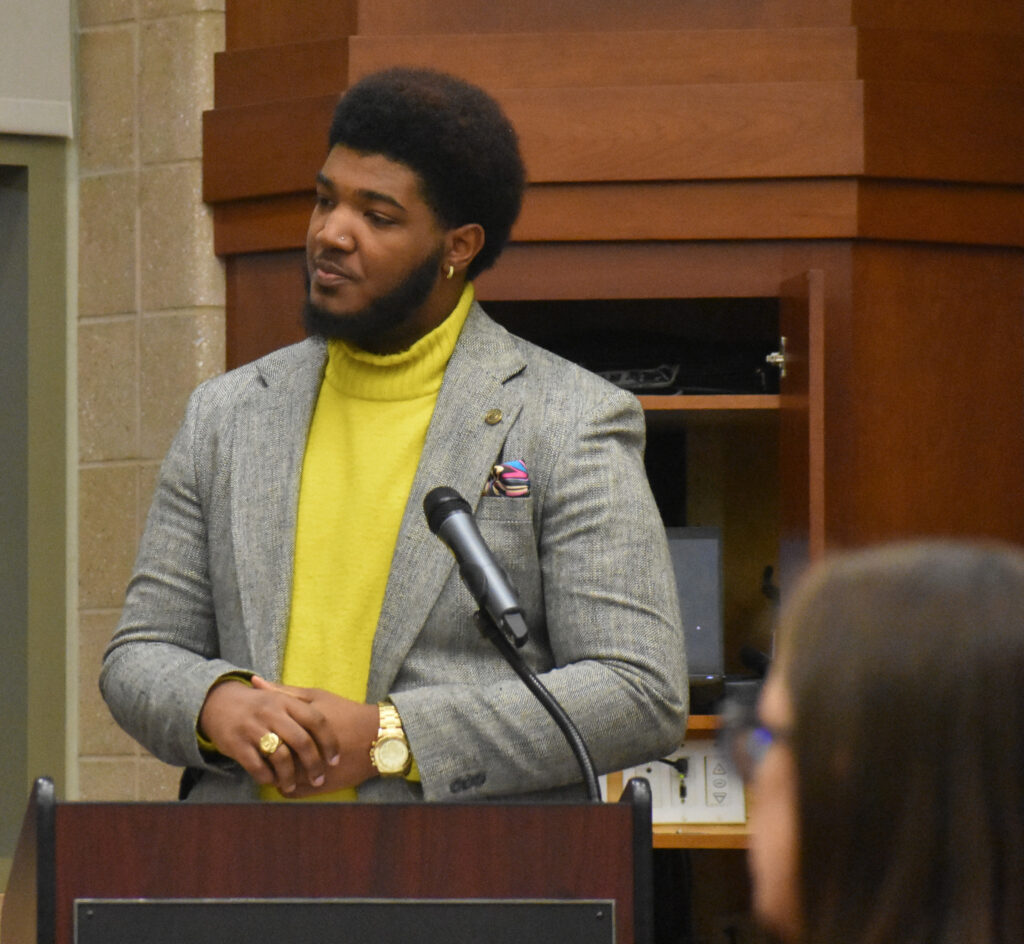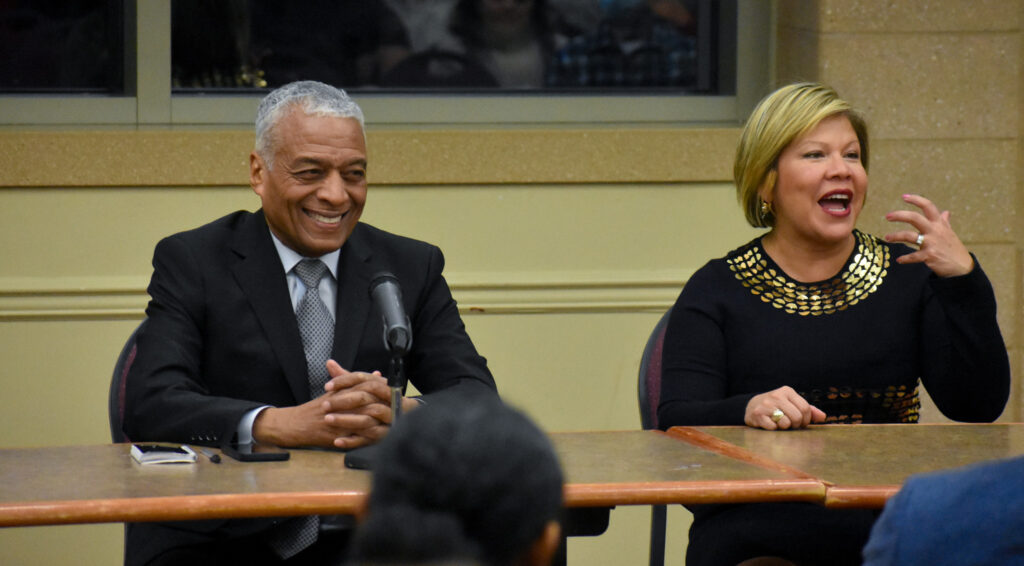
Students host candidates after Rebovich debate controversy
By Jake Tiger
As part of the university’s Black History Month program, an anti-voter-suppression discussion took place in Daly Dining Hall’s Mercer Room on Feb. 18, serving as a response to a Rider-sponsored debate not featuring U.S. Senate candidates Patricia Campos-Medina and Lawrence Hamm.
The debate, which occurred just after the anti-voter-suppression event, was the first New Jersey Senate debate and was between Rep. Andy Kim and New Jersey First Lady Tammy Murphy, who are the leading candidates for Senate in the New Jersey Democratic primary election, according to recent polls.
Despite being candidates in the same Senate race, Hamm and Campos-Medina, who are Black and Latina, respectively, could not participate in the debate because they failed to meet certain criteria established by the debate’s organizers, one of whom was Rider’s Rebovich Institute for New Jersey Politics.
As candidates representing New Jersey’s Black and Latino communities, Hamm and Campos-Medina argued that their “exclusion” from the debate and the strict qualification criteria were emblematic of America’s longstanding problem with voter suppression in minority groups.
Voter suppression is the act of discouraging or preventing certain groups of people from voting in order to alter the outcome of an election.
“Our communities need to see us,” said Campos-Medina during the event. “We need to energize our [voter] base. The Democratic Party cannot win without Black and Latino working-class voters, yet they never let us choose our candidates.”
The event lasted from 6:30-7:30 p.m., and it was organized by Hamm and Campos-Medina’s campaign teams in collaboration with Rider’s Black Student Union, Rider’s NAACP chapter and Rider Latinas Unidas.
“We really need candidates who represent who we are,” said Student Government Association President Naa’san Carr, who is the president of Rider’s NAACP chapter and a member of BSU.

The debate that followed, sponsored by the Rebovich Institute, the New Jersey Globe and On New Jersey, was a virtual debate between Kim and Murphy that took place from 8-9:30 p.m., just after the anti-voter-suppression event.
Multiple Rider students posed questions to the candidates during the debate via pre-recorded videos.
One student asked from her dorm room, “What can you do in the Senate to help students and graduates with crippling student debt?”
Candidate qualification criteria
The three sponsors were heavily involved in organizing the debate, which included outlining the controversial candidate qualification criteria.
Other Senate candidates, like Campos-Medina and Hamm, could have qualified for the debate if they met certain requirements before the debate’s qualification deadline, but no other candidates were added.
One of the ways candidates could qualify was by raising at least $750,000 for their campaign and receiving “a public endorsement by Democratic elected officials and municipal/county party chairs from at least five municipalities,” according to the New Jersey Globe.
According to Micah Rasmussen, the director of the Rebovich Institute for New Jersey Politics and a moderator for the debate, these types of qualifications are common at all levels of politics, and when it comes to planning a debate, the choice between having every candidate participate or only the two most popular ones is “always a tough call.”
“We have to be realistic here: most voters are thinking about, ‘Am I voting for Andy Kim, or am I voting for Tammy Murphy?’” said Rasmussen. “The choices that [voters] are facing at this point are probably not Larry [Hamm] and Patricia [Campos-Medina].”
There are obvious benefits to hearing every candidate’s perspective on issues, but Rasmussen pointed out that having a head-to-head discussion makes it easier for the audience to compare and contrast the two candidates, while a more “dispersed” debate makes those comparisons harder and gives each candidate less time to explain their position.
“We were looking for a debate between the competitive candidates in the race,” said Rasmussen. “We were not looking for a debate in which we were giving exposure to candidates who might eventually be competitive … It was a question of hearing from the candidates who most voters were considering at that point.”
Hamm and Campos-Medina claimed that financial barriers like the $750,000 fundraising requirement are a threat to democracy because they limit the number of people who can be viable in an election and further strengthen the belief that money equates to power in America.
“My feeling is that $750,000 is the minimum that it’s going to take to get your message out,” said Rasmussen. “Whether we like it or not, if they don’t have the ability to drive their message, then they’re not going to win their race.”
Campos-Medina, who had only been campaigning for about six weeks when she visited Rider, said she should not be punished for not having the time or wealthy connections that other candidates may have.
“Money makes a campaign easy, and this is the problem in New Jersey politics,” said Campos-Medina.
Kim, who has been a New Jersey representative for six years, and Murphy, the wife of New Jersey Gov. Phil Murphy, were both personally invited to the debate, according to the New Jersey Globe.
During the debate later that night, Tammy Murphy said, “The amount of money in politics is really disgusting. I will be the first to say that.”
Candidates also had a chance to qualify for the debate by receiving at least 10% of votes at the Feb. 10 Monmouth County Democratic convention, but no candidates beside Kim and Tammy Murphy met the threshold. The convention’s voting results were as follows: Kim with 57%, Murphy with 39% and Campos-Medina with 4%. Hamm was on the ballot, but withdrew shortly before voting began and received zero votes, according to the New Jersey Globe.
While the two candidates did not meet the 10% threshold, Campos-Medina argued that simply having them in the debate could have gotten Black and brown people excited about voting, potentially boosting their numbers to the point of being a viable candidate.
“Do not allow them to tell you that there is no choice other than Andy Kim and Tammy Murphy,” said Campos-Medina. “There are two more choices in this election.”
‘Very undemocratic’
During the discussion, Hamm and Campos-Medina said there was hypocrisy in excluding them from the debate, as politicians often vie for the votes of Black and brown people, while simultaneously overlooking candidates from those communities.

According to Hamm, voter suppression dates back to the founding of the U.S., when only white, property-owning men could vote.
Campos-Medina mentioned that her mother went to a polling center to vote in the 2016 presidential election but was turned away because of her ethnicity and “broken English,” despite being a registered voter and having lived in the U.S. for over 30 years.
Hamm claimed that many voter-registration procedures can be considered forms of voter suppression because they make it more difficult for people to become voters, specifically in Black and brown communities that lack voter education and resources.
“All of that is designed to keep you from voting,” said Hamm. “If we ever get a situation where the masses of people could freely vote … [the people in power] would be swept away. … Our system, which is called ‘democratic,’ is very undemocratic.”
Hamm suggested that implementing same-day registration would be a feasible step toward ending voter suppression, meaning people could show up to polling sites, register and vote all at once without the extra steps and deadlines. Currently, voters must register at least 21 days prior to elections.
According to a 2021 study from the University of Massachusetts Amherst, same-day registration can increase Black and Latino voter turnout by as much as 17%.
Hamm specifically encouraged Rider’s NAACP chapter and BSU to fight for same-day registration.
“We’re going to do what Mr. Hamm said and send a letter to our state,” said Carr, who moderated the discussion.
New Jersey’s primary elections will take place on June 4, where parties will select a candidate to run for Senate in the general election on Nov. 5.
Voter registration resources can be found on Rider’s website by searching, “NJ Voter Registration.”


